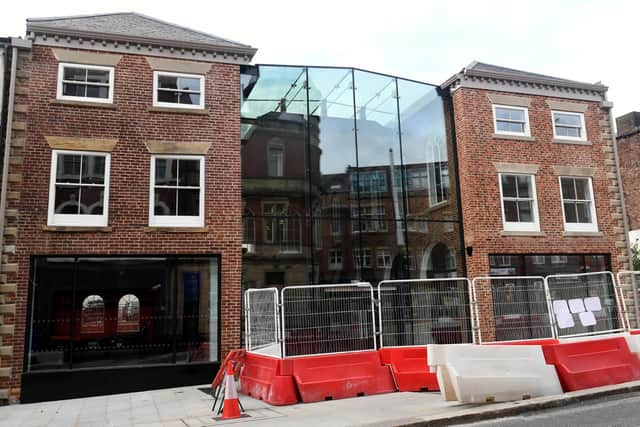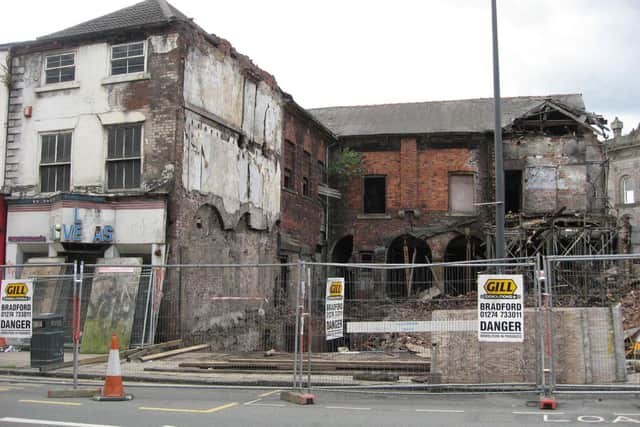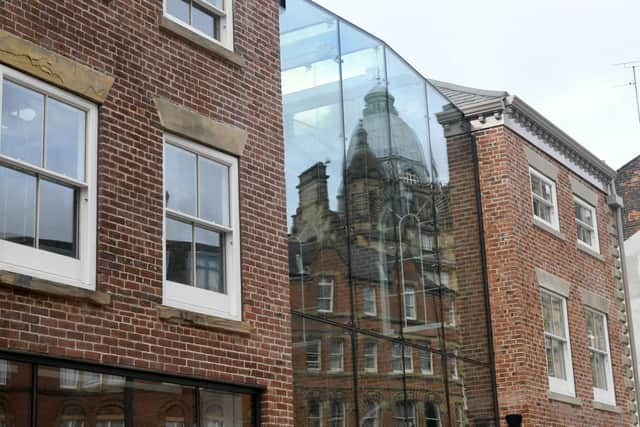The First White Cloth Hall in Leeds has been removed from Historic England's At Risk Register after more than 20 years of neglect
and live on Freeview channel 276
But as time passed, industries changed and history gave way to modern times - the fortunes of the First White Cloth Hall on Kirkgate, one of Leeds' most historically relevant buildings, changed for the worse.
After a variety of other uses, by the 1980s the First White Cloth Hall was vacant. By 2010 it was completely disused and had fallen into a state of beyond poor disrepair.
Advertisement
Hide AdAdvertisement
Hide AdFor more than 20 years, historical experts and enthusiasts in the city have campaigned to save the building, which, by then had been listed by Historic England as one of the country's sites that was "most at risk of being lost forever as a result of neglect, decay or inappropriate development."


However, today it has been confirmed that following an extensive programme of works by the building's current owners, Rushbond PLC, the First White Cloth Hall has been removed from the Heritage at Risk Register.
Delight
The news has been welcomed by a delighted Leeds Civic Trust.
Director Martin Hamilton told the Yorkshire Evening Post the decision was even more important at the First White Cloth Hall is one of the historical buildings in Leeds that sometimes gets over-looked and could well prove to be a catalyst for further investment and improvement in the Kirkgate area of the city.


Advertisement
Hide AdAdvertisement
Hide AdHe said: "It has been at risk for a very long time, it has been in a state really since the 1970s. It has had lots of alterations over the years, the building which is U-shaped and the court-yard were covered up over the years.
"We have been campaigning to have the building restored for 20 years. It has a real significance to the history of the city. It was the first covered market for selling white cloth and is part of the story of Leeds as a textile centre as from 1711 and then on, the textile industry took off in Leeds.
"It is a really important building and we are delighted that it has been restored. The original shape of the building is now visible from the outside and they have done an excellent job in finding materials that match the existing. It is a lovely building and it will hopefully give the area of Kirkgate a bit of a lift as well. After 300 years the building has got another life."


Had it not been for organisations such as the trust and the council campaigning to save the building, it might have been forgotten about.
Advertisement
Hide AdAdvertisement
Hide AdMr Hamilton added: "Very often, buildings at risk don't have a particularly interesting history but when you have a building that you can explain why it is important that becomes an easier campaign. Others like the Corn Exchange and the Town Hall are in the public eye and more attention is paid to them. It tends to be the ones that are less familiar that get forgotten about but this deserves to be better known."
Culture Funding
The First White Cloth Hall is one of 17 across Yorkshire that have been removed from the Register. Many have been saved thanks to the hard work and dedication of local communities and owners, who have come together with public funders to rescue places despite the challenges wrought by the Covid-19 pandemic over the past 18 months.
Over the past year Historic England has awarded £1.8m in grants to historic places in Yorkshire, more than £800,000 of which came from the Government’s Culture Recovery Fund.
Trevor Mitchell, Regional Director for the North East and Yorkshire at Historic England said: “Our heritage is an anchor for us all in testing times. It provides beautiful places that make us feel good. This year’s Register shows that looking after our historic places can contribute to the country’s economic and social recovery as well as bring communities together to enjoy their surroundings.
Advertisement
Hide AdAdvertisement
Hide Ad“The 17 sites saved this year in Yorkshire show what’s possible with strong partnerships investing together to secure public benefits. Agencies such as Natural England, the National Lottery Heritage Fund and Historic England recognise the importance that historic places have for their local communities. Whether it’s an overgrown pleasure ground, an abandoned anti-aircraft site, or the forgotten cradle of Leeds’ trading power, it’s clear that restoring our heritage improves people’s lives.”
Coun Jonathan Pryor Deputy Leader and Executive Member for Economy, Culture, and Education, said: "We are of course delighted the First White Cloth Hall has been removed from Historic England’s at-risk register, continuing our strong track record for working with heritage bodies, building owners and businesses to conserve our historic buildings.
“The ball really began rolling on this project back in 2012 when we were successful in securing a sizable grant from the National Lottery Heritage Fund and Historic England to restore the hall and other buildings on Kirkgate, for which we are very grateful.
“Kirkgate is literally Leeds’ first street and this hall plus a number of buildings in the surrounding area are incredibly important to the history and heritage of our city so it was clear to all we needed to take action to protect them.
Advertisement
Hide AdAdvertisement
Hide Ad“Restoration and improvements have made the hall more commercially attractive, while adhering to heritage standards. Rejuvenation of the hall complements wider works around the Corn Exchange that have resulted in the growth new businesses as well as helping the city celebrate one of its founding industries.”
History of The First White Cloth Hall
The First White Cloth Hall on Kirkgate in Leeds was built in 1711 for the sale of undyed cloth, a role successively taken on by the second, third and fourth White Cloth Halls. Today only the first and third survive. The hall represents the beginnings of the city’s wealth, through its successful cloth trade. It was originally built to dissuade traders from moving away to a new covered cloth hall in Wakefield.
Over the years the building was used for many purposes, but by the 1980s it was largely vacant. Completely disused by 2010, it fell into very poor condition.
Today, thanks to the passion of the Leeds Civic Trust which argued for its preservation, and a regeneration project led by Rushbond, in partnership with Historic England, the National Lottery Heritage Fund and Leeds City Council, the story of this Grade II* building begins a new chapter as an ambitious and dynamic occupier is sought for the space.
Advertisement
Hide AdAdvertisement
Hide AdSupport the YEP and become a subscriber today. Enjoy unlimited access to local news and the latest on Leeds United. With a digital subscription, you see fewer ads, enjoy faster load times, and get access to exclusive newsletters and content. Click here to subscribe.
